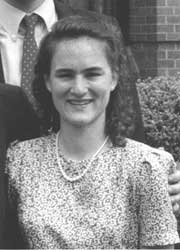Accused killer Howard Godfrey is trying to toss a key piece of evidence that authorities say irrefutably ties him to the 1991 murder of Patricia Scoville in Stowe.
Kerry B. DeWolfe, Godfrey’s lawyer, has filed motions to suppress a DNA sample taken from Godfrey in 2000 that police say matches evidence found at the crime scene.
DeWolfe also wants to suppress statements Godfrey made to police when he was arrested in 2005.
Separate motions have been filed by the Vermont Attorney General’s office, which is prosecuting the case. Prosecutors want to use evidence from a 1997 assault conviction against Godfrey and to suppress evidence Godfrey’s lawyer might use related to the DNA testing of other criminals.
A judge will rule on the motions at hearings scheduled July 10-11 at Caledonia District Court in St. Johnsbury.
Godfrey, 60, formerly of Morrisville, is charged with one count of aggravated murder, which carries a maximum penalty of life in prison without possibility of parole. He pleaded not guilty in April 2005 and is being held without bail at the St. Johnsbury Correctional Center. The trial is scheduled to start in October.
Scoville, 28 when she died, was found buried under leaves in the Moss Glen Falls area of Stowe. She had been sexually assaulted and died of asphyxiation, an autopsy showed.
About 14 years after the killing, police said they zeroed in on Godfrey, based on newly discovered DNA evidence that linked him with traces found on Scoville’s body.
An FBI analyst made the connection; the Vermont Forensics Lab told police that the probability the DNA match was wrong was 1 in 235 quadrillion.
Since their daughter’s murder, David and Ann Scoville of Canandaigua, N.Y., have lobbied extensively for DNA-testing technology. Vermont had no DNA database for convicted offenders at the time.
In 1996, the Scovilles’ lobbying paid off, with both Vermont and Rhode Island establishing DNA databases that would check offenders’ genetic profiles against those in the national system.
In court papers, DeWolfe argues that the DNA sample extracted from Godfrey violated his constitutional right against unreasonable searches and seizures.
In 1997, Godfrey was convicted of clobbering a woman in the head with a mallet at his home in Morrisville. That crime put Godfrey’s DNA profile into a database in January 2000. On Feb. 28, 2005, federal officials say they randomly matched Godfrey’s DNA profile with evidence found at the crime scene.
Because Godfrey wasn’t a suspect in the killing at the time that his DNA was collected, there wasn’t a “reasonable suspicion” to conduct a search, as required by the Vermont Supreme Court, DeWolfe argues.
“ A search based on something less than a reasonable suspicion would violate the Constitution,” DeWolfe writes.
In addition, DeWolfe seeks to suppress statements that Godfrey made to police, saying the way in which Godfrey was interrogated violated his constitutional right to due process.
After the DNA link was made, police said they kept Godfrey under surveillance for about a month at his business in Orleans. Police collected additional DNA samples from Godfrey’s cigarette butts.
Armed with new evidence and help from a behavioral science expert, Stowe police detective Bruce Merriam and Det. Ed Meslin of the state police confronted Godfrey at his business on March 30, 2005.
Godfrey denied the charges, but later admitted that he’d had sex with Scoville, police allege in an affidavit filed with the court.
“Uh, you obviously have, uh, the evidence that I had sex with Patricia Scoville and that was my concern up there — if I admitted to that, then automatically you were gonna charge me with murder,” Godfrey told police, according to the affidavit. “I just admitted to you that I did have sex with her, but that’s without a lawyer present. I think that is as far as I should go.”
There is no evidence Scoville knew her alleged killer, police said.
In the court motion, DeWolfe argues that the police team decided that, before arresting Godfrey, “they would attempt through certain interrogation techniques to obtain a confession from him.”
“There was no way he was leaving that day other than in handcuffs,” DeWolfe writes.
DeWolfe argues that police “consistently maintained” Godfrey was “guilty of the murder and that they just wanted to know why he had done it.” Police did not advise Godfrey of his Miranda rights to have a lawyer present, DeWolfe alleges.
DeWolfe also alleges that, when Godfrey requested a lawyer several times, police persisted in questioning him, and “ultimately, Mr. Godfrey made statements against his interest.” That means Godfrey’s statements were “involuntary and thus inadmissible,” DeWolfe writes.
Responses to the motions had not been filed with the court as of press time.
A key witness deposition in the case has been scheduled for Aug. 14. The prosecution and defense will depose Dr. Paul Morrow, the former chief medical examiner for Vermont, who now lives and works in Australia and will be back in the U.S. at that time.
The attorney general’s office says in court papers that it won’t bring Morrow back to testify at the October trial, but wants to get his testimony now as a precaution.

















(0) comments
Welcome to the discussion.
Log In
Keep it clean. Please avoid obscene, vulgar, lewd, racist or sexual language.
PLEASE TURN OFF YOUR CAPS LOCK.
Don't threaten. Threats of harming another person will not be tolerated.
Be truthful. Don't knowingly lie about anyone or anything.
Be nice. No racism, sexism or any sort of -ism that is degrading to another person.
Be proactive. Use the "Report" link on each comment to let us know of abusive posts.
Share with us. We'd love to hear eyewitness accounts, the history behind an article.